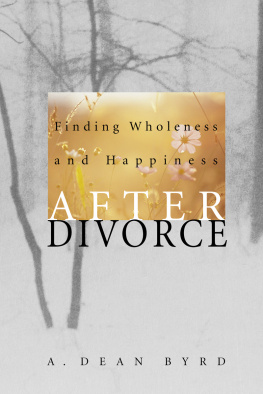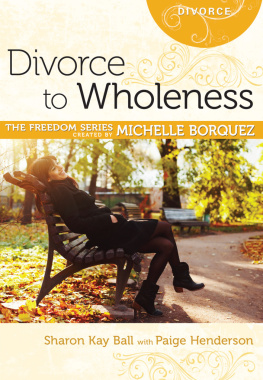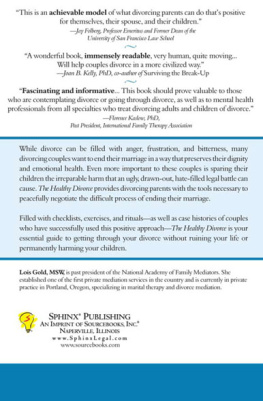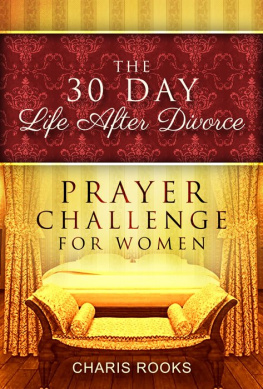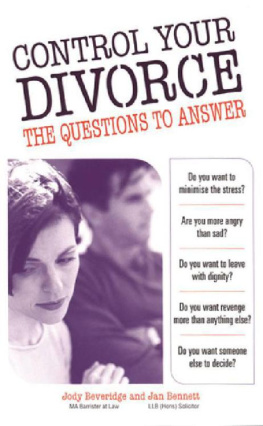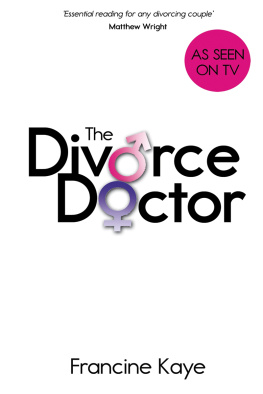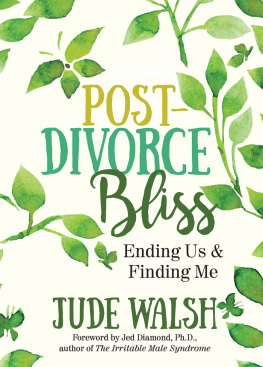Finding Wholeness and Happiness After Divorce
A. Dean Byrd
1997 A. Dean Byrd.
All rights reserved. No part of this book may be reproduced in any form or by any means without permission in writing from the publisher, Deseret Book Company, P.O. Box 30178, Salt Lake City Utah 30178. This work is not an official publication of The Church of Jesus Christ of Latter-day Saints. The views expressed herein are the responsibility of the author and do not necessarily represent the position of the Church or of Deseret Book. Deseret Book is a registered trademark of Deseret Book Company.
Libraryof Congress Cataloging-in-Publication Data
Byrd, A. Dean, 1948
Finding wholenessand happiness after divorce / by A. Dean Byrd.
p. cm.
Includesbibliographical references and index.
ISBN 1-57345-294-7(hardbound)
ISBN 978-1-59038-316-2(paperbound)
1.DivorcePsychological aspects. 2. Divorced peopleLife
skills guides. 3. DivorceReligious aspectsChurch of Jesus
Christ of Latter-day Saints. I. Title.
HQ814.B98 1997
306.89dc21 97-30919
CIP
Printedin the United States of America R. R. Donnelley and Sons, Crawfordsville, IN
10 9 8 7 6 5 4 3 2
Cover photography: (background) JimFrank/PHOTONICA, (inset) Takeshi Odawara/PHOTONICA
Acknowledgments
Its hard to know how to express gratitude to those whocontributed to this book. Sheri Dew, vice president of publishing at DeseretBook Company, saw a need and invited me to respond. To those who contributedindividual chapters, their work involved so much more than just offering theirtime and talents. They willingly shared parts of their personal lives, whichlent their thoughtful counsel a kind of expertise that could have come in noother way. Sally H. Barlow, Ph.D., is an associate professor of psychology atBrigham Young University. She is a gifted teacher and therapist. Her rarecombination of professionalism and sensitivity makes her truly a personneextraordinaire. Brent and Jan Scharman areaccomplished psychologists, esteemed colleagues, and caring people. Brent is anassistant commissioner, LDS Social Services; Jan is assistant vice-president ofstudent life and dean of students at BYU. Judy and Kelly Claytons lives aretrue examples of the power of love. Their expertise comes from their hearts.
And Elaine Walton. I was not acquainted with her beforebeginning this book. Colleagues recommended Elaine, an associate professor inthe School of Social Work at Brigham Young University, as the person to writethe chapter on single parenting. They said, She has an indomitable spirit. Shecan relate because she has been there. Reading and rereading her chapter is atestimony of the power of the Lords grace in our lives. She has beenstrengthened by her struggleand blessed. Now she blesses the lives ofothers.
Each of the contributors knows something about findingwholeness and happiness again after divorce. They all have traveled the road.But none of them traveled the road alone. Each bears a special witness of thehealing influence of the Savior in their lives. They have affirmed my belief inthe Savior and his promise to never let us walk alone.
My appreciation to Anette Cunningham who helped me put thebook together. She knows more about computers than anyone I have ever met.Technical expertise flows from her fingertips. Thanks, Anette.
Finally, special thanks to Linda Ririe Gundry, my editor atDeseret Book. Linda was always available, always helpful.
Chapter 1
Introduction
DIVORCE. Country songs are written about it. The sixties calledit liberating. The nineties called it devastating. Media statistics arealarming: of every 100 couples in the United States who marry, 40 to 50 coupleswill divorce sometime during their lives. Church leaders have repeatedly warnedmembers about divorce and the destruction of the family. In 1995, the FirstPresidency of the Church issued The Family: A Proclamation to the World, anofficial declaration focused on the family. The proclamation concludes with aprophetic utterance: Further, we warn that the disintegration of the familywill bring upon individuals, communities, and nations the calamities foretoldby the ancient and modern prophets.
Notwithstanding the above, divorce occurs. Its consequencesare tragic. But there is hope. Lives can be healed. The Lord has promised thatthere is no struggle for which his grace is not sufficient. Divorce is noexception. There may be disappointment, depression, and despair. But suchconsequences need not last. Your journey toward wholeness and happinesscontinues, and life can be good again.
This book is not aimed at preventing divorce, though it mayhelp. Rather, its focus is on helping those whose lives have been affected bydivorce. What are the consequences of divorce? How do you heal the wounds? Howshould you feel? What about your former spouse? And the children?
It is helpful to understand the effects of divorce on yourlife and on the lives of those around you. Frequently divorce brings on thegrieving process, ambivalent feelings of anxiety and relief, fears, and boutswith depression. Time does help in the healing process, but reminders oftenbring with them comparisons: Am I really better off now? Should I have triedharder? Maybe it was my fault? Will Iever be happy again? Will I marry again?
During the past twenty-five years, I have counseled manypeople whose lives have been affected by divorce. In most cases they haveconcluded that there was a window of time when perhaps divorce could have beenavoided and the marriage preserved. I would agree.
Marriages, like people, are dynamic and do not stay still.Stresses of marriage can either bring a couple closer or drive them apart. Arelationship that is not nurtured will deteriorate. Even when there aretremendous difficulties, if both spouses are willing to work to make changes inthemselves, marriage is workable. Thereal sadness about divorce is that many people, particularly young people, are notprepared for marriage. They take marriage too lightly, and when there areproblems, they give up too soon. Divorce is too readily available. Immaturity,poor judgment, and poor relationship skills often contribute to divorce.
With this brief introduction, let me tell you about thisbook. The book is about relationshipshow they work and what is helpful.Whether or not your marriage endures, an understanding of the workings ofrelationships can be very helpful. Often divorce is preceded by a relationshipthat has gone awry. Understanding what has happened in this process can helpyou in other relationships. When divorce does occur, you can take avenues tominimize the negative impact of the experiencea kind of damage control. Livescan be put back together. Healing can occur. Children can be helped in theadjustment process.
Relationships after divorce are different, both in quantityand quality. For example, the relationship to your former spouse may decreasein terms of quantity of time, but if there are children, you may actually wantto work at improving the quality of your time and your interactions with yourformer spouse. Together with him or her, you have to decide what is best forthe children. Your relationships with your former spouses family may fade,while your relationships with your own extended family may become closer.Brothers, sisters, and parents are valuable sources of support. Yourrelationships to your children often take on a more intimate dimension. Newfriendships develop and old friendships take on different characteristics.

